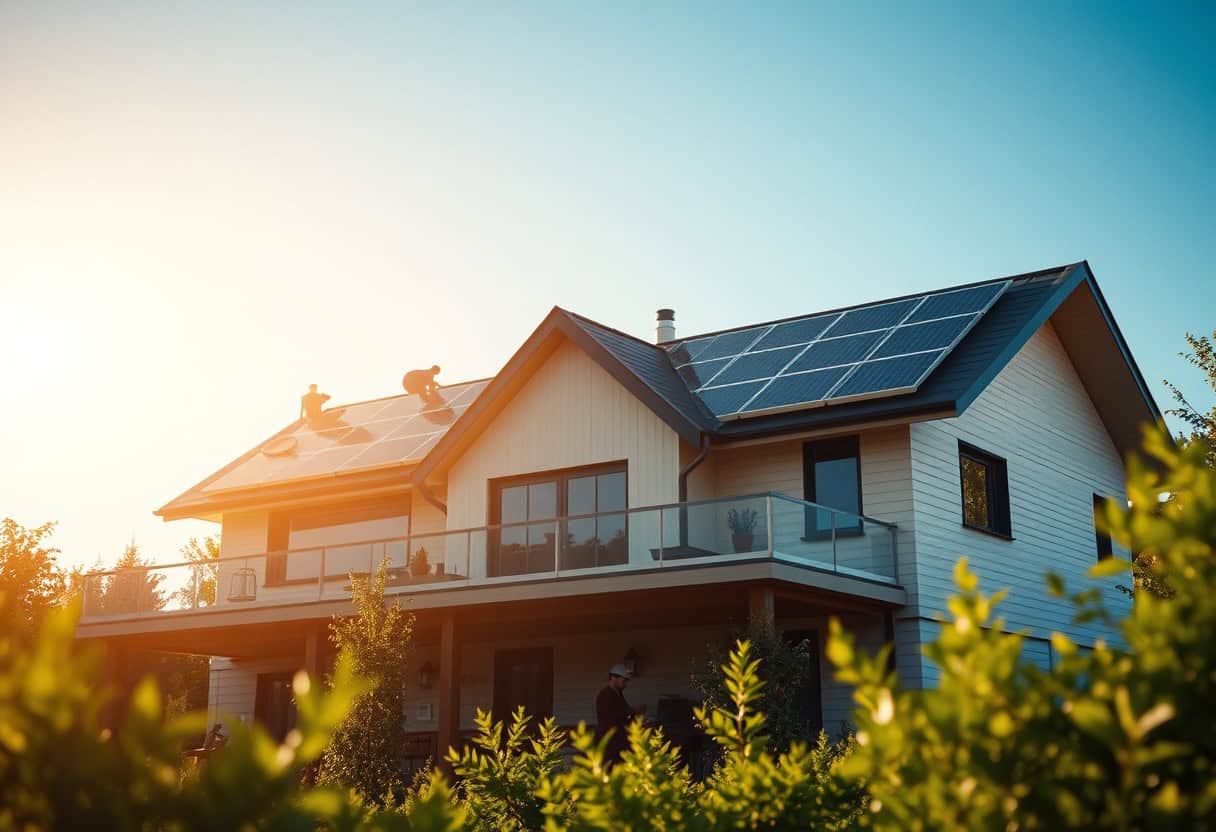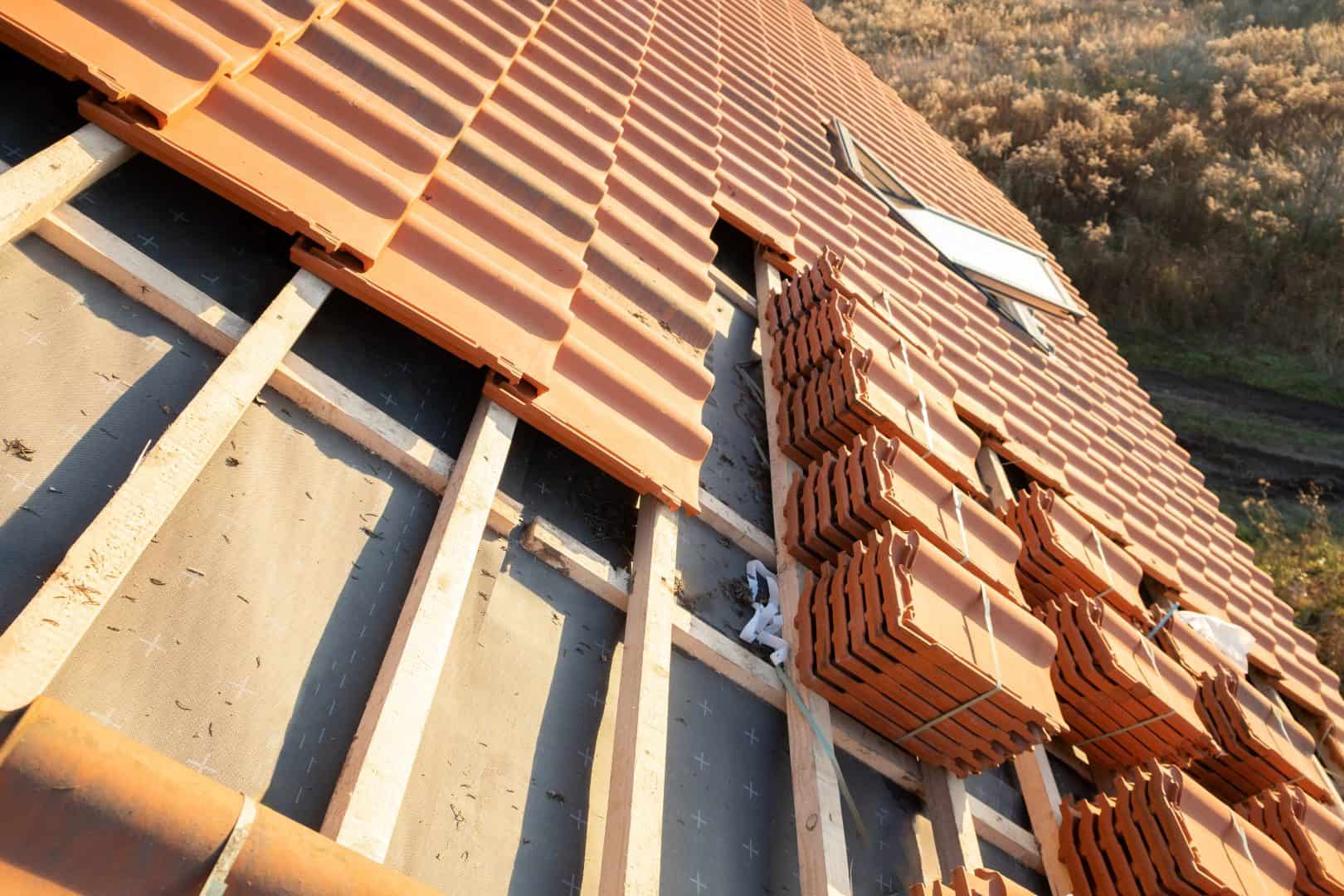Can I install solar panels on my new roof?
Fill Out The Form And We'll Get Back To You

You may be considering installing solar panels on your new roof, and it’s an excellent way to harness renewable energy while potentially saving on electricity bills. However, it’s crucial to ensure your roof is suitable for this upgrade. Factors such as roof orientation, material, and structural integrity play a significant role in determining if solar panels can be installed safely and effectively. In this post, we will explore the key considerations you need to make before commenceing on this sustainable journey.
Benefits of Installing Solar Panels on a New Roof
A significant advantage of installing solar panels on your new roof is the potential for long-term sustainability. By harnessing solar energy, you not only reduce your carbon footprint, but you also contribute to the overall reduction of greenhouse gas emissions. This transition to renewable energy can help combat climate change, ensuring a healthier environment for future generations. Additionally, having solar panels integrated with your new roof can lead to a more aesthetically pleasing design, as they can be installed seamlessly, enhancing the value and visual appeal of your property.
Environmental Impact
The environmental benefits of solar panels are profound. By generating your own electricity from sunlight, you diminish your reliance on fossil fuels, which are a primary cause of air pollution and environmental degradation. Furthermore, solar energy is a clean, renewable resource that significantly reduces water consumption compared to traditional power generation methods. This shift towards sustainable energy not only protects precious natural resources but also promotes biodiversity by diminishing the harmful effects of climate change.
Energy Cost Savings
Panels installed on your new roof can lead to substantial energy cost savings over time. By generating your own electricity, you will become less reliant on the grid, allowing you to offset your energy expenses significantly. This financial independence translates into lower monthly utility bills, and with government incentives and rebates available, the initial installation costs could be recouped quicker than you might expect. Furthermore, the ongoing rise in energy prices makes solar panels an increasingly attractive investment for homeowners looking to secure their financial future.
Cost savings extend beyond just your immediate energy bills; solar panels can also increase the overall value of your home. With the added benefit of generating clean energy, you may find that your property stands out in the market. Additionally, when you choose solar energy, you can insulate yourself from fluctuating energy prices, fostering a sense of stability and certainty in your household budget.
Roof Considerations for Solar Panel Installation
Clearly, your roof plays a pivotal role in determining whether solar panels can be installed effectively. It is important to assess its overall condition, structure, and suitability for the installation process. Factors such as age, integrity, and any existing damage must be considered, as a compromised roof might require repairs or replacement before you can successfully move forward with solar panel installation. You should also ensure that your roof can sustain the weight of the solar panels, along with any associated materials. If in doubt, consulting a roofing professional is highly advisable.
Roof Material Compatibility
With various roofing materials available, it’s crucial to determine which ones are compatible with solar panel installation. Common materials like asphalt shingles, metal, and tile are generally suitable, but you should be aware that some materials may require different mounting techniques or additional support to ensure stability. It is vital that your chosen roofing material can withstand the structural load imposed by solar panels. If you have a newer roof, this compatibility is likely to be more straightforward. However, if your roof is older or made from less common materials, seeking expert advice is imperative.
Roof Orientation and Pitch
Considerations regarding the orientation and pitch of your roof are also significant when installing solar panels. Ideally, roofs that face south will capture the most sunlight, thereby enhancing the efficiency of your solar energy system. Furthermore, a roof pitch between 30 and 45 degrees is often regarded as optimal for solar panels, as it allows them to receive maximum solar exposure throughout the day. However, if your roof has a less than ideal orientation or pitch, it doesn’t necessarily mean your solar efforts are futile; there are various solutions to mitigate these challenges.
Panel placement can be adjusted based on the orientation and pitch of your roof to ensure you still receive adequate sunlight exposure. For instance, solar panels can be installed at specific angles to optimise their performance, or utilise technology such as solar trackers that can follow the sun’s path. It is important to balance aesthetics, functionality, and energy efficiency when making these considerations, ensuring your investment in solar panels is both practical and beneficial in the long run.
Types of Solar Panels Available
Now, as you consider installing solar panels on your new roof, it’s important to understand the different types available to you. Each type has its own unique features, benefits, and potential drawbacks. Here’s a quick overview of the main options you might encounter:
| Monocrystalline | Highly efficient, made from single crystal silicon, space-efficient. |
| Polycrystalline | Generally lower cost, made from multiple silicon crystals, less efficient than monocrystalline. |
| Thin-Film | Lightweight and flexible, lower efficiency, suitable for specific applications. |
| Bifacial Panels | Can absorb sunlight from both sides, offers higher energy output. |
| Building-Integrated Photovoltaics (BIPV) | Integrated into building materials such as roofs and windows, aesthetically pleasing. |
The choice between these options will depend on your specific energy needs, budget, and the design of your home. Each solar panel type has its own advantages and disadvantages, so it’s crucial to assess which one will best suit your situation.
Monocrystalline vs. Polycrystalline
With monocrystalline panels, you can expect high efficiency and longevity, making them an excellent choice if space is limited on your roof. They are crafted from single silicon crystals, which lends to their sleek appearance and remarkable power output. However, they do tend to come at a higher price point. Conversely, polycrystalline panels are typically more affordable, as they are made from multiple silicon crystals. While they may offer slightly lower efficiency rates, they provide a practical and budget-friendly solution if you have ample roof space.
Ultimately, the decision between monocrystalline and polycrystalline panels should be based on the balance between cost and efficiency that suits your financial planning and energy requirements best. Additionally, installation specifics, such as your roof orientation and potential shading issues, can also influence your choice.
Thin-Film Solar Panels
For those considering a flexible solar solution, thin-film solar panels offer a unique option. Made of layers of photovoltaic material, these panels are lightweight and can be integrated into various surfaces. Although they typically have lower efficiency compared to crystalline panels, they excel in situations where conventional panels might struggle, such as on rooftops with irregular shapes or those requiring minimal structural load.
Another important aspect of thin-film solar technology is its cost-effectiveness. They are generally less expensive to manufacture, enabling you to lower your overall investment in solar energy systems. However, you should keep in mind that the overall energy output may be reduced, requiring more space for installation compared to other panel types. Thus, it’s vital to evaluate both your available roof space and power requirements carefully before opting for thin-film solar panels.
Financial Aspects of Solar Installation
Many homeowners are concerned about the financial implications of installing solar panels on their new roof. The initial investment can be significant, but it’s imperative to weigh the long-term benefits against the upfront costs. By understanding the financial landscape, you can make an informed decision that aligns with your budget and financial goals. Additionally, many homeowners find that solar installations can increase the overall value of their property, making it a worthwhile consideration for your investment strategy.
Costs and Incentives
Incentives for solar installation can greatly reduce the overall cost of your system. Various government schemes, rebates, and tax credits may be available depending on where you live, allowing you to offset a substantial portion of your upfront investment. It is vital to research and utilise these incentives as they can significantly enhance the economic feasibility of going solar. Many homeowners feel overwhelmed by the initial expenses, but with the right financial incentives, the path to sustainable energy becomes much more affordable.
Return on Investment
An imperative aspect of going solar is understanding your return on investment (ROI). By installing solar panels, you can save on your electricity bills and potentially earn income through government schemes such as feed-in tariffs. Over time, your solar system will pay for itself, resulting in savings that can span several decades. Additionally, the rise in property value associated with solar installation can further enhance your financial returns, making this not just a green choice, but also a financially sound one.
It is crucial to do your homework before investing in solar panels. Understanding the average payback period, which can range from 5 to 12 years depending on multiple factors like system size and location, will help you gauge when your investment will start yielding profits. Moreover, solar technology is continually evolving, leading to increased efficiency and decreased costs, meaning that your investment today could translate into even greater savings and benefits in the future. Make sure to carefully assess solar panel options and financing programmes, ensuring you find the best fit for your financial situation.
Permitting and Regulations
Not all roofs are created equal when it comes to installing solar panels. Before you invest in solar technology, it’s crucial to navigate the maze of permitting and regulations that can differ significantly from one location to another. Local authorities often have specific requirements for solar panel installations, which can include obtaining permits, adhering to building codes, and perhaps even passing inspections before you can enjoy the benefits of renewable energy. A good starting point for your journey is to research local guidelines or seek advice from professionals. For example, if you’re planning on redoing your roof soon, with the eventual goal of putting solar panels on it, it’s wise to consult with local authorities about any specific regulations that may apply.
Local Building Codes
The compliance with local building codes is vital for any construction or renovation project, and solar panel installations are no exception. These codes dictate structural integrity, safety measures, and aesthetic considerations that ensure your solar panels will be securely installed and operational without compromising your roof’s stability. Failure to adhere to these regulations can lead to serious consequences, including fines and the potential need for costly modifications later on. Therefore, it’s critical to thoroughly research the relevant codes in your area before proceeding.
HOA and Zoning Considerations
To further complicate matters, if you live in a community governed by a Homeowners Association (HOA) or have specific zoning laws, you’ll need to comply with their additional regulations as well. These restrictions can vary widely and may dictate aesthetic requirements, panel placement, and even the type of materials you can use. Understanding these guidelines not only helps you avoid potential disputes but also ensures that your solar installation aligns with community standards and supports your property’s value.
Codes may vary significantly depending on your locality, so it’s imperative to conduct comprehensive research to ensure compliance with both HOA rules and zoning regulations. Engaging with your HOA board early in the process can provide clarity on any restrictions and enable you to present your plans in a way that addresses potential concerns. Taking these steps not only facilitates a smoother installation process but also helps maintain good relationships within your community.
Professional Installation vs. DIY
After deciding to install solar panels on your new roof, you may find yourself weighing the options between professional installation and a DIY approach. While DIY projects can seem appealing, particularly for their cost-saving potential, it’s crucial to examine the implications carefully. For detailed insights on Roof Replacement & Solar Panel Integration, you’ll see how professional expertise can enhance your project significantly. A professional installation ensures that the solar panels are correctly fitted and optimised for performance, providing you with peace of mind regarding both safety and efficiency.
Benefits of Hiring Professionals
To ensure the best results for your solar panel installation, hiring professionals can be incredibly advantageous. These experts have extensive knowledge and experience, allowing them to handle complex installations that comply with local regulations and safety standards. By entrusting this task to a qualified team, you can also save time and avoid the potential pitfalls that might arise from a lack of experience.
Risks of DIY Installation
One of the major risks associated with DIY installation of solar panels is the potential for accidents and injuries. Without proper knowledge of roofing and electrical systems, you could inadvertently cause damage to your roofing materials or choose incorrect mounting techniques, leading to structural issues. Additionally, improper installations may void warranties or even lead to severe consequences, such as water leaks or electrical failures, which could be costly to rectify.
Installation of solar panels yourself can often sound like an invigorating challenge, but it comes with considerable risks. Not only do you face the danger of working at heights without the right safety gear or knowledge, but you also run the risk of miscalculating your energy needs, leading to inefficiency in generating power. Ultimately, while harnessing the sun’s energy at home is rewarding, it is crucial to consider whether the DIY route aligns with your skills and the potential ramifications of any mistakes.
Conclusion
To wrap up, installing solar panels on your new roof is not only feasible but can also provide numerous benefits for your home and environment. You should consider factors such as the roof’s orientation, pitch, and structural integrity to ensure that it is suitable for solar installation. Scheduling a professional evaluation can provide valuable insights into the best panels for your needs and any necessary adjustments your roof may require to support them effectively. Furthermore, installing solar panels can significantly reduce your energy bills and increase the value of your property, making it a worthwhile investment.
Additionally, you should explore available grants and incentives that can help mitigate the initial costs of installation. Many regions offer financial assistance for homeowners venturing into solar energy, increasing accessibility for you. By educating yourself on the process, you can make informed decisions that align with your goals for sustainability and financial savings. With the right preparation and guidance, you can confidently embrace solar energy as a reliable and eco-friendly solution for your new home.
FAQ
Q: Can I install solar panels on my new roof?
A: Yes, you can install solar panels on your new roof as long as the roof is structurally sound and meets the necessary requirements for installation. Installing solar panels on a new roof can be advantageous, as it often ensures that both systems are compatible and can potentially maximise the efficiency of your solar energy system. However, it’s crucial to consult with a professional installer to assess the roof’s orientation, pitch, and shading to optimise panel placement.
Q: Will installing solar panels void my roof warranty?
A: It depends on the terms of your roof warranty. Some warranties may be voided if alterations are made to the roof, such as installing solar panels. However, many roofing manufacturers now allow solar installations on roofs without voiding the warranty, provided that the installation is conducted by a certified professional. It’s crucial to review the warranty conditions and consult both the roofing contractor and the solar panel installer before proceeding with the installation to ensure compliance and protection.
Q: What type of roof is best for solar panel installation?
A: The best type of roof for solar panel installation typically has a south-facing slope, which receives maximum sunlight throughout the day. However, east and west-facing roofs can also be suitable. Additionally, roofs made of materials like asphalt shingles, metal, and flat roofs can accommodate solar panels effectively. It’s vital to consider the roof’s age, condition, and angle, as well as any potential shading from nearby trees or buildings. Consulting with a solar energy expert can help determine the best roofing options for solar panel installation based on your specific circumstances.
New Roof
The guys made a fantastic job of re-roofing our house. They were quick, courteous and excellent value for money.
Chimney Repair
We employed Wrights Roofs to repair our very old chimney – tht had seen better days. They carefully repaired, repointed and re-leaded our chimney which should last me out.
Solar Panel Installs
We had panels that needed putting onto our pitched roof. The guys from Wrights did a great job.
Roofs, Flat Roofs Chimneys and Solar Panels
If you need roof work on your home, please complete the form or call us today.

